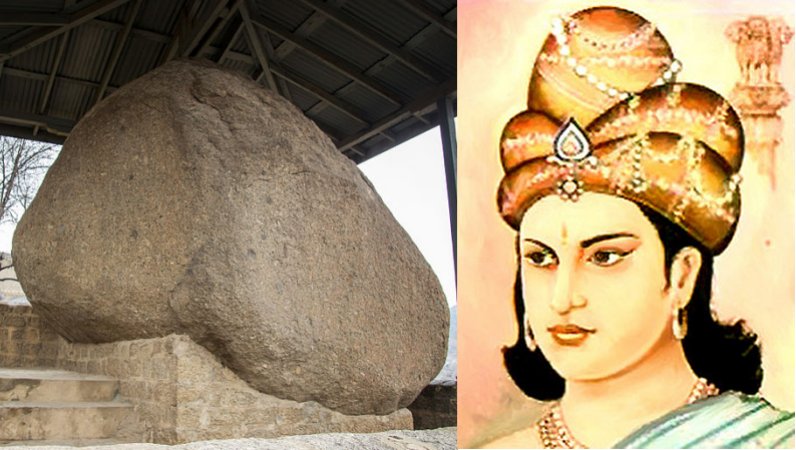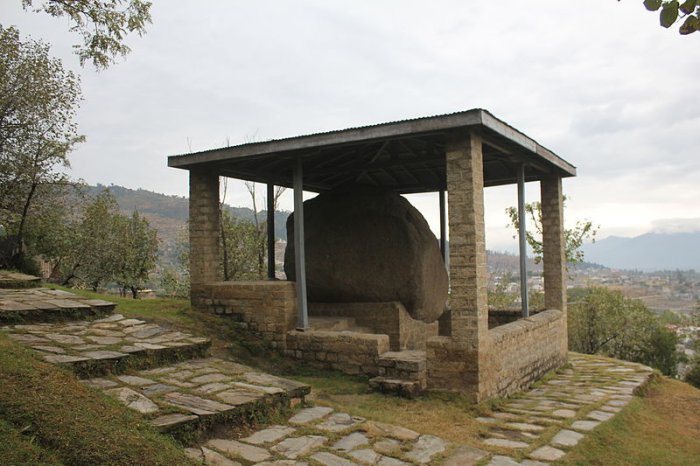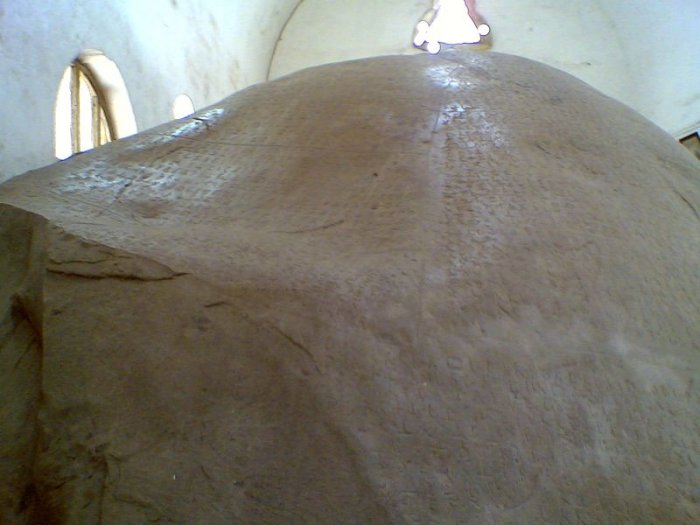Mansehra Rock Edicts – Last Words Of Emperor Ashoka
Ellen Lloyd - AncientPages.com - Emperor Ashoka (304 B.C -232 B.C.) is long gone but this great historical figure left behind an everlasting legacy and he is remembered for his energy, determination, and promotion of Buddhism. Considered one of India's greatest emperors, Ashoka ruled almost all of the Indian subcontinent from 268 to 232 B.C.
Left: The giant rock of Ashoka. Credit: Faysal Elahi, CC BY-SA 4.0 - Right: Artistic impression of Emperor Ashoka. Credit: Pinterest
“From the Volga to Japan his name is still honored. More living men cherish this memory today than have ever heard the names of Constantine or Charlemagne,” H.G. Wells writes in the Outline of History. 1
The early part of his reign was undoubtedly bloodthirsty, but after witnessing the mass deaths of the Kalinga War, Emperor Ashoka changed as a person and converted to Buddhism.
Emperor Ashoka won the Kalinga War, a battle fought between him and the Mauryan army led by King of Raja Anantha, but the price was high. The war took a tremendous toll of life and property. More than 100,000 soldiers were killed, and 150,000 civilians were deported.
One of the major rock edicts with an inscription made by Emperor Ashoka. Credit: Muhammad Zahir, CC BY-SA 3.0
Legend tells that one day after the war had finished, Emperor Ashoka came to the city and he was shocked to see the complete destruction and dead corpses. The horrible scenes of death led to his conversion to Buddhism and he became a more peaceful emperor.
Emperor Ashoka’s last words were preserved for future generations. The Mansehra rock edicts, cut into the surface of three large boulders can be found on a small rocky mountain outside the city of Mansehra in Khyber Pakhtunkhwa province of Pakistan. The edicts date back to the 3rd century B.C. and it is widely believed the text is written in the ancient Indic script of Gandhara culture, Kharosthi.
In the fourth rock edict and three others, scientists found evidence that Emperor Ashoka “wished to remind his subjects of certain religious shows at which he had exhibited to them in effigy the gods whose abodes they would be able to reach by the zealous practice of dhamma.” 2
On the thirteenth edict, Emperor Ashoka expressed his feelings after witnessing the destruction of Kalinga.
According to the translated text, Ashoka felt great remorse for what had happened.
Major Rock Edict contains inscriptions by Ashoka. Credit: Jadia Gaurang, CC BY-SA 3.0
“Directly after the Kalingas had been annexed began His Sacred Majesty’s zealous protection of the Law of Piety, his love of that Law, and his inculcation of that Law. Thence arises the remorse of His Sacred Majesty for having conquered the Kalingas, because the conquest of a country previously unconquered involves the slaughter, death, and carrying away captive of the people. That is a matter of profound sorrow and regret to His Sacred Majesty.” 3
The Mansehra rock edicts are of great historical importance, but due to environmental degradation, the ancient script is fading away and it’s almost impossible to read the message today. Pakistan has tried to cover the rocks with canopies to shelter the boulders from weather conditions. Hopefully, this important historical site can be saved, and the last words of Emperor Ashoka will still be accessible to future generations.
The site has been submitted for inclusion in the UNESCO World Heritage Sites and is currently on the tentative list.
Written by Ellen Lloyd – AncientPages.com
Copyright © AncientPages.com All rights reserved. This material may not be published, broadcast, rewritten or redistributed in whole or part without the express written permission of AncientPages.com
Expand for references- G. Wells – The Outline of History
- Hultzsch, E. "New Readings in Asoka's Rock-Edicts." Journal of the Royal Asiatic Society of Great Britain and Ireland, 1913, 653-55
- Vincent Smith - Asoka: The Buddhist Emperor of India
More From Ancient Pages
-
 Advanced Ancient Knowledge Of Chemistry – From Chrome Plating To Nanotubes
Ancient Technology | Jun 12, 2019
Advanced Ancient Knowledge Of Chemistry – From Chrome Plating To Nanotubes
Ancient Technology | Jun 12, 2019 -
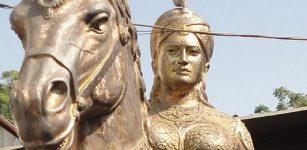 Rudrama Devi – Warrior Queen Of The Kakatiya Dynasty And First Female Ruler Of South India
Featured Stories | Jul 27, 2021
Rudrama Devi – Warrior Queen Of The Kakatiya Dynasty And First Female Ruler Of South India
Featured Stories | Jul 27, 2021 -
 Discovered Roman Malting Oven Could Be Evidence Of 2,000-Year-Old Beer Production In The UK
Archaeology | Apr 4, 2022
Discovered Roman Malting Oven Could Be Evidence Of 2,000-Year-Old Beer Production In The UK
Archaeology | Apr 4, 2022 -
 Face Of Neanderthal Who Lived 56,000 Years Ago Reconstructed
Archaeology | Nov 10, 2023
Face Of Neanderthal Who Lived 56,000 Years Ago Reconstructed
Archaeology | Nov 10, 2023 -
 2,000-Year-Old Stringed Instrument Found In Vietnam
Archaeology | Feb 22, 2023
2,000-Year-Old Stringed Instrument Found In Vietnam
Archaeology | Feb 22, 2023 -
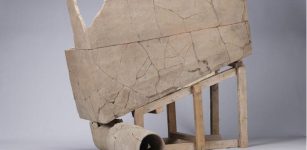 2,400-Year-Old Flush Toilet Discovered In China
Archaeology | Feb 24, 2023
2,400-Year-Old Flush Toilet Discovered In China
Archaeology | Feb 24, 2023 -
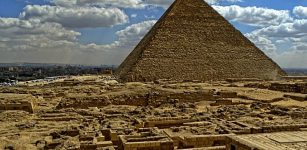 Secrets Of Cheops’ Pyramid: Does The Newly Found Chamber Contain An Iron Throne?
Archaeology | Jan 13, 2018
Secrets Of Cheops’ Pyramid: Does The Newly Found Chamber Contain An Iron Throne?
Archaeology | Jan 13, 2018 -
 Rare Stone Age Artifacts Found In Norway Offer Evidence Of Migration From The East
Archaeology | Aug 24, 2023
Rare Stone Age Artifacts Found In Norway Offer Evidence Of Migration From The East
Archaeology | Aug 24, 2023 -
 Secret Underground Chambers Of Caynton Caves And The Knights Templar Connection
Featured Stories | Aug 13, 2019
Secret Underground Chambers Of Caynton Caves And The Knights Templar Connection
Featured Stories | Aug 13, 2019 -
 Modern Humans Have Their Homeland In Botswana – New Study
Archaeology | Oct 29, 2019
Modern Humans Have Their Homeland In Botswana – New Study
Archaeology | Oct 29, 2019 -
 DNA From 35,000-Year-Old Romanian Skull Reveals Flaws In The Theory Of Evolution
Archaeology | May 25, 2021
DNA From 35,000-Year-Old Romanian Skull Reveals Flaws In The Theory Of Evolution
Archaeology | May 25, 2021 -
 Hyperborea Or Atlantis Ruins – Underground Secrets Of The Sacred Lake On The Arctic Circle
Civilizations | Nov 17, 2014
Hyperborea Or Atlantis Ruins – Underground Secrets Of The Sacred Lake On The Arctic Circle
Civilizations | Nov 17, 2014 -
 10 Mysterious Ancient Manuscripts With Hidden Secrets
Featured Stories | May 27, 2016
10 Mysterious Ancient Manuscripts With Hidden Secrets
Featured Stories | May 27, 2016 -
 Mystery Of The Haraldskærkvinnan (Haraldskærwoman) – Bog Body Of A Viking Queen?
Featured Stories | Apr 8, 2024
Mystery Of The Haraldskærkvinnan (Haraldskærwoman) – Bog Body Of A Viking Queen?
Featured Stories | Apr 8, 2024 -
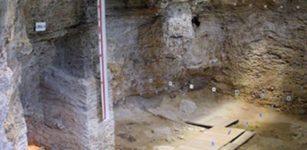 Abric Romaní Cave: New evidence indicates Neanderthals used to heat water some 60,000 years ago
Human Beginnings | Aug 31, 2015
Abric Romaní Cave: New evidence indicates Neanderthals used to heat water some 60,000 years ago
Human Beginnings | Aug 31, 2015 -
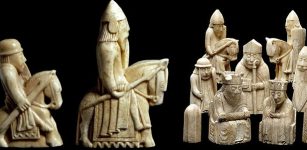 Mystery Of The Beautiful Viking Uig Chessmen Found On The Isle Of Lewis, Scotland
Artifacts | Dec 14, 2015
Mystery Of The Beautiful Viking Uig Chessmen Found On The Isle Of Lewis, Scotland
Artifacts | Dec 14, 2015 -
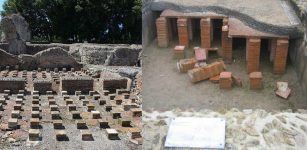 Hypocaust – First Central Heating Invented By Ancient Romans 2,000 Years Ago
Ancient History Facts | Jan 14, 2018
Hypocaust – First Central Heating Invented By Ancient Romans 2,000 Years Ago
Ancient History Facts | Jan 14, 2018 -
 Mystery Of The Ancient Reptilian Gods Remains A Complex Subject – Alien Worlds – Part 2
Featured Stories | Feb 9, 2022
Mystery Of The Ancient Reptilian Gods Remains A Complex Subject – Alien Worlds – Part 2
Featured Stories | Feb 9, 2022 -
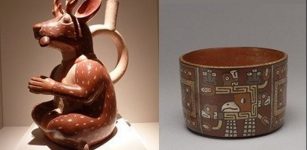 Genes And Languages: Development Of Pre-Incan Culture In Central Andes
News | Oct 26, 2020
Genes And Languages: Development Of Pre-Incan Culture In Central Andes
News | Oct 26, 2020 -
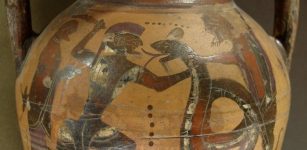 Cadmus – Legendary Phoenician Hero And Founder Of Prosperous City Of Thebes
Featured Stories | Sep 6, 2023
Cadmus – Legendary Phoenician Hero And Founder Of Prosperous City Of Thebes
Featured Stories | Sep 6, 2023

